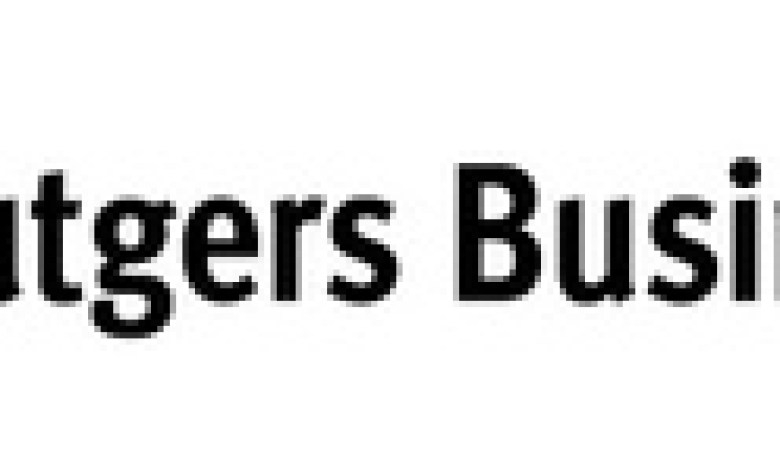Students from the Rutgers business school develop problem solving skills thanks to experiential learning in each academic major

This year, students competed for cash prices in the window of experiential learning which forced them to show how they applied the knowledge and skills acquired in classes to problems or commercial opportunities in the real world.
Piscataway, NJ,, May 8, 2025 / Prnewswire / – Two members of the organization of student social entrepreneurship Enactus won $ 8,000 has Rutgers Business School Presentation of experiential learning to effectively demonstrate how their class knowledge contributed to cultivating a hydroponic agricultural business, a method of plant growth using a water solution rich in nutrients instead of the soil.
With a mixture of passion and team $ 20,000 in price.
In all, 71 students through the two campuses of the Rutgers Business School – a mixture of the two first cycle And diploma – contributed to the inaugural event. The registrations they detailed to judges and spectators went from commercial enterprises and cooperative experiences to professional services according to their studies.
Lei Lei, the dean of the Rutgers Business School, is a long -standing supporter of experiential learning and the value it adds to the education of a student.
“Companies in all industries face an ever -increasing level of uncertainty and complexity,” said Lei. “It is more important than ever for our students to develop problem solving skills thanks to experiential learning.”
The window of experiential learning aimed to offer students a platform where they were able to demonstrate the essence of experiential learning – by applying the knowledge and skills acquired in classes to problems or commercial opportunities in the real world. This went further, asking them to describe the impact of their efforts and to think about the personal and professional growth they have won accordingly.
Teacher Mason AmericanExecutive director of experiential learning who organized the event, described experiential learning as part of DNA to the Rutgers Business School – obvious in each discipline, courses and extracurricular activity. “We present something that happens every day inside the business school,” said Ameri.
Kapadia and Moreno are part of a student team who built the enects agoravable farms to combat food insecurity in Rutgers and the New Brunswick area. Use of hydroponic systems – a soil -free agricultural technique that requires little space – the company has grown up $ 4,000 For lettuce last year. Their products are distributed thanks to partnerships with a coffee campus and a center for the basic needs of students.
The judges awarded a $ 7,000 Second prize to finance students – Malik Vazquez,, Issa Jadallah And Jose Jimenez Gratereaux – who are members of Association of Latinos professionals for America has Rutgers Business School-Newark. The team has created an investment fund managed by students who will pay scholarships to ALPFA members.
The ALPFA Fund team has also won the Rutgers choice Prize after receiving the greatest number of spectators during the event.
Senior accounting student Kevin Cheung won the third prize of $ 5,000 After describing how he managed members of Beta alpha psi Last year in a volunteer effort preparing income declarations for low income New Brunswick residents.
Michael Iicyn, a leader of JP Morgan Chase and one of the three judges, said a word while he was starting to announce the winners and the impact of their projects. “Wow,” he said.
The judges were struck by the potential impact of winning projects, he said, as well as by the maturity and the skills of the students. “You have done a great job for where you are in your professional career,” he said. In addition to iicyn, Daniela KoumidesA Rutgers MBA former former employee in Cigna, and Alan OlegarioA Microsoft and Rutgers Engineering Alumnus account director were judges.
Professor Ameri said the window is a first step to highlight the large experiential learning imprint within the Rutgers Business School. “We have deployed the event to celebrate the exceptional work of our students, but just as important, to highlight a fundamental element of experiential learning which is often not observed: reflection,” he said.
Each team had to create a poster board explaining their project, its impact, what classes were applied to the project and what they won thanks to the experience. During the first round, the three judges went to each poster, listening individually the students, asking questions and offering comments. After the first round, the judges reduced the field to six finalists.
The finalists had to make a pitch style presentation detailing their projects and experiences, how they applied their knowledge and what they have acquired thanks to their efforts.
Students who managed the ALPFA fund told judges that they used knowledge of their financing lessons to find undervalued investment opportunities and identify different stock styles. They also learned discipline and patience, they said, by organizing workshops to provide members with an understanding of the world of investment.
“Yes, we manage a fund, but we are also investing in people,” Vazquez said judges.
Cheung told the judges that it had acquired project management experience and delegation skills by directing students who helped prepare hundreds of income tax declarations New Brunswick residents. In one case, he told the judges, the students made a correction on the income declaration of a single mother who provided her with a reimbursement of $ 12,000 – Additional money to spend on food, accommodation or clothing.
Kapadia and Moreno, the winners of the first place, won points for their knowledge of the measures around the company and for their public skills. The two students said they went from public speaking experience in a series of pitch competitions. Their efforts have borne fruit.
“This victory is really changing the trajectory,” said Moreno after the competition. “This gives us the resources necessary to develop the project significantly and bring our impact to the next level.”
Source Rutgers Business School





